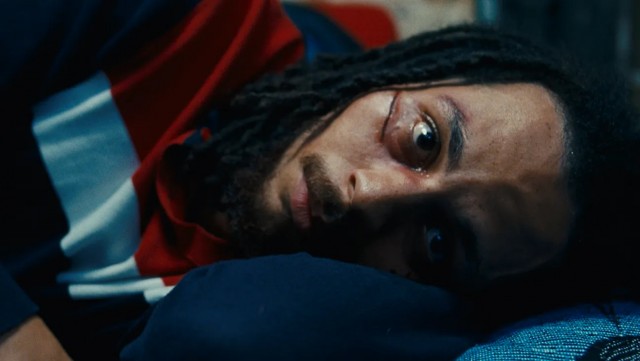With a title suggesting the murder of a notorious British politician (and ex-Prime Minister), Musa Alderson-Clarke’s NFTS short, Killing Boris Johnson, was always going to garner attention. However, while the name of his film was criticised for its potential to “normalise violence”, underneath that controversial moniker is the gut-wrenching tale of an individual deeply betrayed by their government. Fuelled by the writer/director’s own grief during COVID restrictions, years after the lockdown this short has lost none of its raw, emotional power.
“My own grief and the feelings of anger and confusion manifested in this film”
With Johnson the leader of the United Kingdom during COVID, he will largely be remembered for a series of scandals, including his own inability to follow the guidelines set by his government. While the ex-Prime Minister hosted gatherings at his official residence, countless individuals across the country were unable to bid farewell to their loved ones – including writer/director Alderson-Clarke.
“I was coming to terms with my own grief and the feelings of anger and confusion manifested in this film”, the director reveals as we discuss the inspiration behind Killing Boris Johnson. Angry at his government, confused by his country and laden with grief, Alderson-Clarke set out to create a film that could serve as “a voice for other people who went through this confusing period of unprecedented upheaval”.
Determined to ensure that Johnson wasn’t just remembered as “this comical bumbling prime minister”, infamous for getting stuck on zip wires and flattening 10yr olds during rugby matches. Alderson-Clarke wanted to make a film that held Johnson accountable for his actions as leader of the UK, reminding us that “his ineptitude in governance had real life consequences”.

Shadrach Agozino is electric as his portrayal of a young man struggling with grief.
Centred around a young man (Kaz) reeling from this death of his mother, who decides to attempt to assassinate Johnson, the filmmaker admits that the actions of his lead character are “incredibly drastic”. But like many of us, Alderson-Clarke was shocked by “how much disregard” certain politicians had for the experiences of the general public and so created a film that captured the “intense and angry” response to their actions.
The film that emerges is just as intense and angry as those reactions and as we accompany Kaz on his misguided journey for vengeance, the tension escalates relentlessly over the course of the short’s 24 minutes. As Shadrach Agozino delivers a commanding performance, infusing his character with a crucial sense of humanity, the result is an unsettlingly authentic depiction of a man driven to the brink by the shortcomings of their government.
While it’s difficult to relate directly to Kaz’s actions, it’s hard not to empathise with his frustrations. He’s been let down and betrayed by those running the country and is left utterly powerless to enact any meaningful change in the aftermath – something many will be able to relate to. Regarding Killing Boris Johnson as a film intended to provoke violence seems to overlook the broader context. Alderson-Clarke’s intent is not to incite violence but to inspire change. As a filmmaker, he saw an opportunity to make a statement and “attempt to impact the world” – how could he resist?

 Rob Munday
Rob Munday